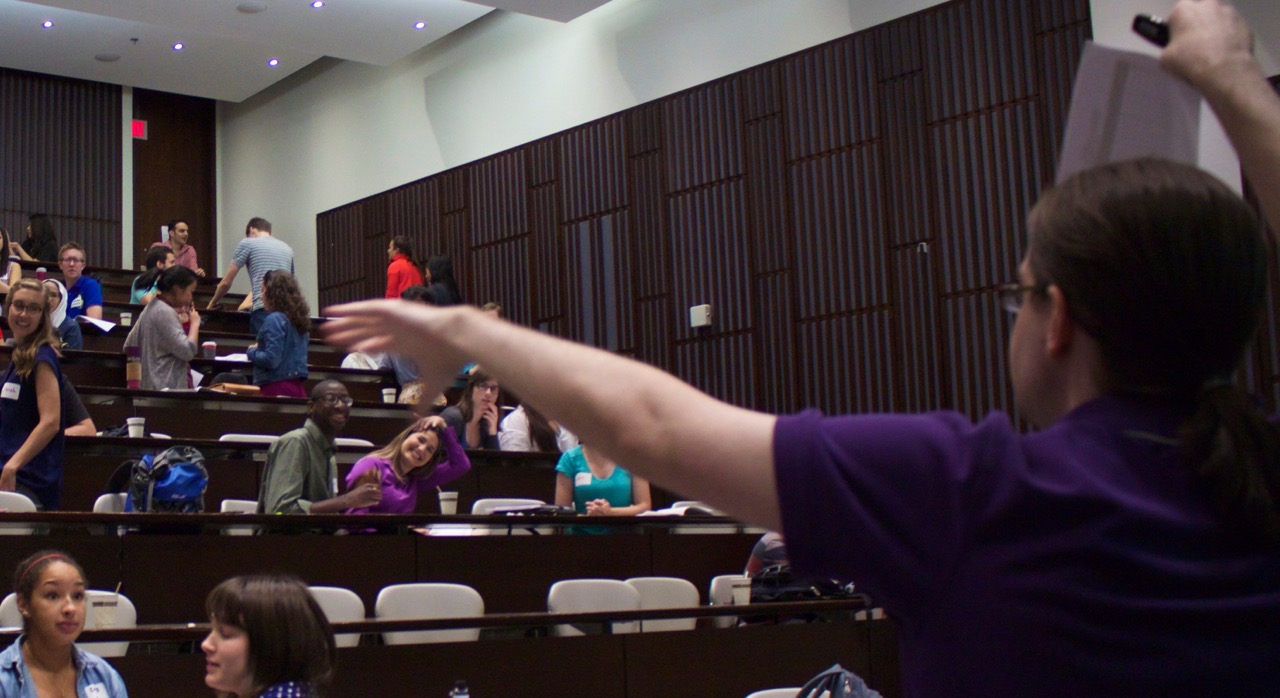Day-Long Symposium on Large Classroom Teaching in Math and Science Builds Community and Increases Knowledge

By Erin Macnab, Programs Coordinator, CTSI
Large class teaching can be one of the greatest challenges a University of Toronto instructor can face – and can also be one of the most fulfilling. Finding strategies to engage students, leveraging technologies to ‘shrink’ the classroom, and building communities for undergraduates are key to making the large class teaching experience a rewarding one for all involved. Sharing these strategies with other instructors who also teach large classes is an invaluable way to reflect and enhance your own teaching practice. A recent event hosted by Kris Quinlan (Chemistry) and Andy Dicks (Chemistry) underlines how important these opportunities for sharing are.
This day-long symposium on large class teaching in science and math courses, based on the UofT Teaching & Learning Symposium model, took place on February 19, 2016. Seven presentations involving teaching faculty from Astronomy, Computer Science, Ecology & Evolutionary Biology, Cell & Systems Biology, Physics, Mathematics and Chemistry explored pedagogy in large classrooms, sharing best practice tips and tricks, examining technology-enhanced large classroom teaching practices and supporting students in and outside the classroom in innovative ways. 30 members of the community from across seven departments and divisions attended the symposium. This targeted sharing of ideas brought a diverse group of people together to benefit from the wealth of knowledge across different contexts and departments.
Presenters included Mike Reid (Dunlap Institute for Astronomy & Astrophysics), who offered an inspiring look at engaging students while teaching in Convocation Hall, Alfonso Gracia-Saz (Mathematics) reflecting on the use of Crowdmark, an online collaborative grading platform that allows teaching assistants to grade electronically and give detailed feedback, and Kris Quinlan (Chemistry), who discussed providing support to students outside of formal lectures in order to ease the transition from high school to university studies.
Feedback from symposium participants was extremely positive, as each talk provided valuable and relevant information on teaching and coordinating large courses. Attendees were exposed to new teaching practice or administrative tips that they could immediately use in their own courses.
Sharing teaching strategies, dilemmas and innovations with peers is a rewarding way to build community and learn more about your own teaching practice. When instructors have the chance to come together and engage in reflection and discussion on what they do every day, new ways of thinking about and doing things emerge. As a faculty member who attended the symposium remarked, “meeting faculty in other departments was the best part of the day.” By building these connections, collegiality and community grows not only within, but between science departments.
We encourage other departments, divisions and disciplines who might be interested in running an event like this on large classroom teaching or any other pedagogical area of interest to contact Erin Macnab, CTSI Programs Coordinator. CTSI can connect you with faculty who have run these symposia, or have experience in certain areas, and provide you with resources and tip sheets that can guide your discussions and sessions.